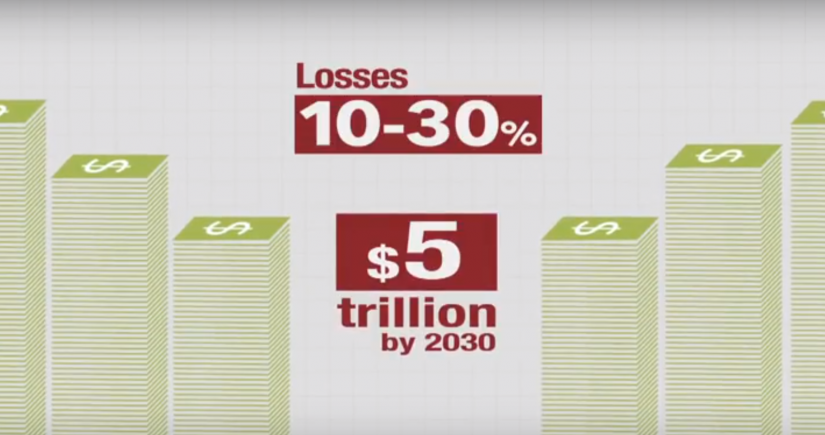
Today,CoST Chair, Chrik Poortman joined a distinguished Panel at the OECD Integrity Forum to debate how we can ‘Strengthen the Governance of Infrastructure Investment’. In our latest blog, Chrik outlines some of the key issues that to be considered to ensure efficiency of investment in public infrastructure.
Today, CoST has launched a new film that demonstrates the importance of transparency and accountability in delivering better value from public infrastructure. This is an opportune time to launch this film given how investment in infrastructure has been in the global news:
Late last year the “Global Infrastructure Initiative” was announced at the G20 Summit in Brisbane to stimulate economic growth and employment creation worldwide. We have also seen the “Asian Infrastructure Investment Bank and the EU Infrastructure Fund newly created to tackle regional infrastructure gaps.
The IMF World Economic Outlook of end 2014 indicates that the push for infrastructure is appropriate in response to global economic down turn BUT thepotential gains depend critically on a number of factors, most importantly, the quality and execution of projects, i.e. the efficiency of investment.
Infrastructure investment underpins socio-economic development as it is the delivery vehicle for crucial physical assets (roads, ports, water supply, power) and critical social infrastructure (schools, hospitals).
Global construction output is expected to grow to US$ 13 trillion a year by 2020 and potentially higher because of these new initiatives. However, the global infrastructure gap is much larger.
TI, OECD and others estimate 10-30% of infrastructure investment is lost through mismanagement and corruption meaning that close to 3 trillion annually, over the next decade, will be wasted if current trends are allowed to continue. Besides increasing costs, corruption and mismanagement can also result in unsuitable, defective and dangerous infrastructure, and loss of life.
Dealing with these issues will determine how successful we will be in meeting our global challenges, such as with the economic recovery, the new sustainable development goals, climate change and disaster relief. In many cases, the poor and disadvantaged bear the brunt of these deficiencies.
But these issues do not only affect developing countries. As we have seen with recent inquiry in Quebec, mismanagement and corruption are also prevalent in developed countries, including the OECD. Tackling waste and inefficiency in infrastructure is a global challenge.
Transparency and accountability
Every precaution needs to be taken to ensure that investment generates maximum growth and benefit for society. Construction remains the sector most prone to corruption (TI surveys).
Part of the solution is a business and regulatory environment that is conducive to allocating resources efficiently and limits opportunities for corruption. Of equal importance is an environment of transparency and accountability in which there is full disclosure of all public infrastructure projects.
Transparency enables stakeholders to make informed judgements about the cost and quality of projects Transparency is also a strong catalyst for reducing mismanagement and corruption. Information to be made available should cover all stages of the project cycle i.e. identification of need, to design, planning, procurement and actual construction.
Information of a truly sensitive or confidential information should be excluded.
Current procedures usually don’t make information available:systematically (case-by-case basis only)
- pro-actively (on demand only)
- comprehensively (don’t extend through project cycle)
- fully (many exceptions)
- accessibly (not to all stakeholders, not in understandable form)
Collective action
Stakeholders in many countries have come together in “collective action” arrangements to promote and manage the disclosure of’ public infrastructure information.
The collective, multi-stakeholder approach, reinforces the commitment of all parties to achieving greater openness in the pursuit of economic, financial and social benefits. Transparency reduces the distrust between parties and ensures that all adhere to the same rules.
All stakeholders (government, private sector, civil society) benefit from such collective action.
Governments realise greater efficiency of public spending, improved quality of public services, enhanced reputation and public confidence, improvement in public health and safety.
The private sector benefits from improvements in the investment climate through a level playing field, predictable business environment creating trust and confidence, and a reduction in risk resulting in improved access to financial markets.
And civil society benefits from greater voice and participation in critical project decisions, better value for money in terms of government expenditures, improved service delivery, and more effective checks and balances with respect to corruption in government.
Demonstrable success
Countries that are implementing such “collective action” program have seen both institutional and project-related progress in bringing about greater efficiency in public infrastructure investment:
- greater transparency in government procurement policies promoting higher levels of competition and greater scrutiny in awarding of contracts
- expansion of disclosure requirements of procuring entities to include information covering the full project cycle
- enhances surveillance of contracting parties with new checks and balances
Resulting in:
- cost savings through project redesign
- reduction of time overruns
- re-tendering of non-competitive procurement
- cancellation of excessively expensive or inappropriately designed/low quality project proposals
- last but not least, detection of issues of possible corruption
The bottom line is better value from infrastructure
G20 in its Seoul Action Plan has called for initiatives that would significantly improve transparency in procurement, construction and infrastructure finance.
Progress has been limited. The issue of efficiency in infrastructure investment — and the urgent need to fight corruption — so far has been absent from the global debate. It was not raised at the Brisbane G20 meeting. So far, it has not been raised during the discussions of the post-2015 development framework.
There has been an implicit recognition of the issue in the recently renewed world-wide emphasis on procurement.
But the issues of efficiency and corruption need to be addressed much more explicitly and the issues to be addressed in this context are much broader than procurement. Appropriate procurement systems are a necessary but not sufficient condition to promote efficiency and weed out corruption. Only full transparency and accountability can do this.
As our new film demonstrates, CoST is a critical tool to the world’s infrastructure investment plans.
